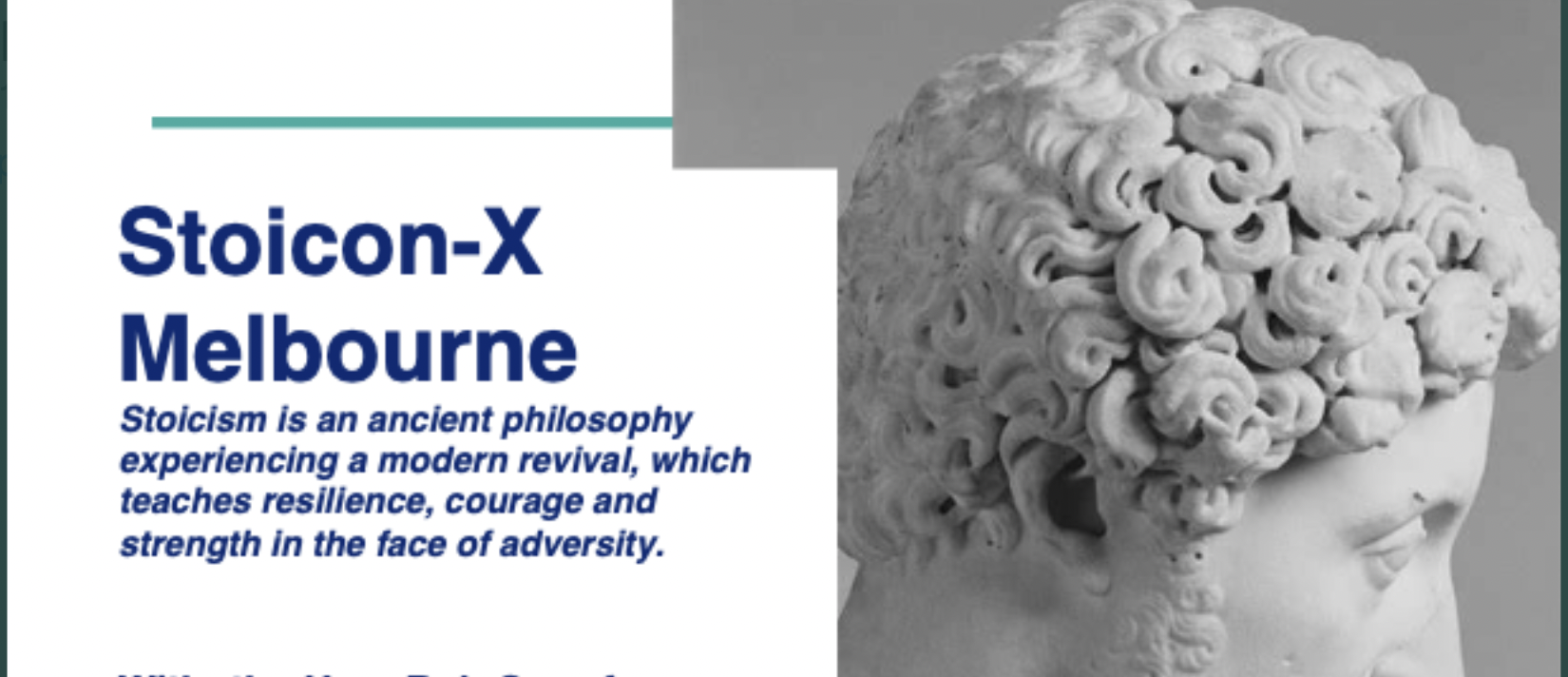Our inaugural in-person Stoicon-X Melbourne event was in planning for nearly a year. False starts, lockdowns, and Covid-related obstacles intervened. But now we received a gift from the gods: the mask mandate for indoor venues in Victoria, Australia, was lifted at midnight, and at 9.30 am around 80 fans of Stoicism were able to meet, in person and all smiles, at the Melbourne Greek Centre for Contemporary Culture. An additional 15 people were registered to attend via Zoom. The first Australian Stoicon having been held in November 2020 for around 25 online participants only, the hybrid in-person and online event represented a quantum leap in scale and complexity.
Associate Professor Matthew Sharpe of Deakin University introduced the event with a short overview of Stoic virtues and ideas. This was followed by a panel discussion: ‘Why is Stoicism Relevant Today?’ featuring (via Zoom) Professor Rob Colter of the Department of Philosophy and Religious Studies at the University of Wyoming; with, in-person, Will Johncock of Sydney, who works in the fields of sociology and philosophy (and is the author of Stoic Philosophy and Social Theory, 2020); and Roger Perry, CEO of the Bevington Group and one of the Asia-Pacific region’s leading productivity improvement and organizational design experts.
All three panelists outlined how they personally became involved in Stoicism. They discussed the Stoic principles which assist them in their work, suggesting texts to which they often recur (notably Marcus Aurelius’s Meditations II.1, a popular choice). As regards Stoic practices, panelists mentioned journaling, premeditation of difficulties, and regular review – and of course the primary practice of assessing which elements of a problem are under our control and which are not. Rob’s account of experiences in teaching Stoic ideas with incarcerated persons was deeply moving, and will be remembered by everyone present.
The next speaker was Judith Stove, also from Sydney, who spoke on the topic: ‘If the Stoics Aim to Live According to Nature, What Might This Mean?’ Roger then took the stage once again to interview Brigadier Glenn Ryan, Director-General Training and Doctrine of the Australian Army. He gave the audience an outline of how Stoic principles such as the improvement of character are key features of Defence training. Developing the capacity of Defence members to make optimal decisions is especially important as most are between the ages of 18 and 25, before the onset of full brain maturity. BRIG Ryan’s insights around leadership have clear application to all walks of life including business improvement.
During the lunch break, attendees were able to view and purchase Stoic-inspired merchandise from Tim Gregory and his partner, of the company Stoic Supply Store. After lunch, Matt and Judith, on stage, were joined, via Zoom, by Bob Carr, former Premier of New South Wales, Australia. Matt asked Bob about his interest in Stoicism, particularly his reading of Marcus Aurelius. As a keen student of history and literature, Bob finds echoes of Marcus’s humility, humanity and justice in figures such as Abraham Lincoln, as well as the ideal of true public service.
Another public figure who has become involved in Stoic teaching and practice is Australian tennis player Pat Cash, winner of Wimbledon (1987) and the Davis Cup (1986), interviewed by Matt in a pre-recorded session. Having achieved world fame in his teens, Pat was well placed to judge the impact of fame and media pressure. He pointed out that while athletes dread getting injured, he found each injury to be an opportunity for growth and change. Along with Justin Stead and John Sellars, Pat is a founding member of the Aurelius Foundation, which aims to support young people in living a life of clarity and purpose.
The final formal session of the day was a book review panel. Lyn Vu, a Melbourne businesswoman and active member of the Melbourne Stoa, took the stage to review Being Better: Stoicism for a World Worth Living In (Kai Whiting and Leonidas Konstantakos, 2021). Lyn found the book extremely helpful, with practical suggestions, biographies of virtuous practitioners, and questions in each chapter for ongoing reflection. Maximus Parker, formerly of Alabama, USA, but also now with a Melbourne business and also active in the Melbourne Stoa, gave a highly insightful discussion of Ernest Hemingway’s classic novel The Old Man and the Sea (1952) from a Stoic perspective. Matt rounded out the session with a review of Sydney academic Edward Spence’s Stoic Philosophy and the Control Problem of AI Technology (2021). The book applies Stoic philosophy to concerns around technology’s impact on human wellbeing. Edward was able to join the discussion via Zoom.
After a stimulating discussion on stage and from the floor, the day culminated in a dinner at a nearby Greek restaurant, where new friendships were consolidated and debates continued. Stoicon Melbourne has made a great start and will certainly be back. Thanks to the Modern Stoicism organization, Deakin University, and the Greek Centre for Contemporary Culture for their partnership.
Videos are available from the event. Here are four of them:
Matthew Sharpe speaks in a pre-recorded interview with Australian tennis great Pat Cash
Roger Perry, CEO Bevington Group, in conversation with Brigadier Glenn Ryan, Director-General Training and Doctrine, Australian Army
Judith Stove, ‘If Stoics Want to Live According to Nature, What Might That Mean?’
Book Review Panel. Lyn Vu, Maximus Parker, and Matthew Sharpe.
The Stoicon Melbourne Team is comprised of Will Johncock, Roger Perry, Darren Saffin, Matthew Sharpe, Judith Stove, and Lyn Vu




